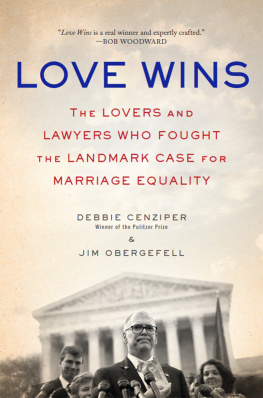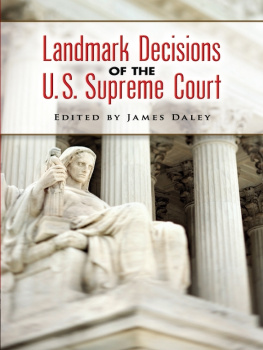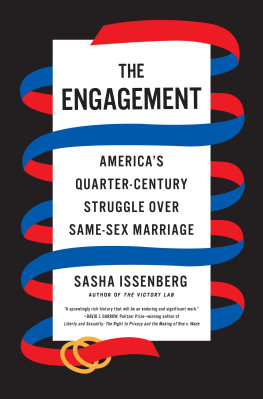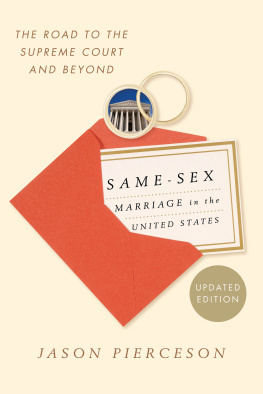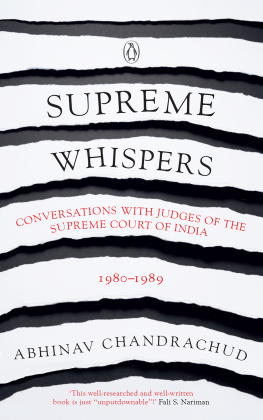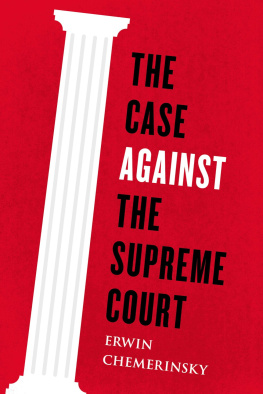J ULY 16, 2013
SOON IT would be time for good-bye. His husband was dying, and with a gentle knock on the bedroom door long past midnight, it would come now, quickly. But Jim Obergefell, married for five days, didnt want to think about a funeral, not on this bright July morning when Cincinnati was in the throes of summer and his husband, John, was sitting up in bed because the spasms that coursed from his hips to his toes had mercifully subsided.
John Arthur couldnt wear a wedding ring. The weight of it hurt his fingers. He was naked under an electric blanket because clothing made his skin burn. His voice, what was left of it, had become winded and hoarse, a labored delivery of syllables and sounds that required great concentration and long, shallow breaths. Jim had to bend low to hear him, endlessly struck that a man whod once had such a deep and lyrical laugh could now produce only a whisper. But for five days, John had pushed out a single, perfect word.
Husband.
Good night, husband. Good morning, husband. I love you, husband.
Disease had struck suddenly, just after Johns forty-fifth birthday two years earlier, when his left foot started dragging as if a ten-pound weight was bearing down on his shoe and everything they knew shifted and splintered. The diagnosis of ALS had been a death sentence: the neurological disorder attacks the nerve cells in the brain and spinal cord, eventually robbing every muscle in the body of movement, including the diaphragm, which facilitates air flow to the lungs. Amyotrophic lateral sclerosis literally suffocates its victims to death.
Jim glanced at John in the bedroom theyd once shared, painted pale yellow and dominated by a hospital bed that compressed and expanded beneath Johns weight. Jim had moved to the guest room, but already this morning he had spent several hours in a chair by Johns bedside, watching the news on a television set loud enough to overcome the constant whoosh of an oxygen generator that pumped air through a line looping over Johns ears and up into his nostrils. The bedroom faced east, and Jim had opened the window blinds so John could feel the sun.
On this day, they were expecting a visitor.
Jim was nervous about meeting a civil rights lawyer who had spent the better part of thirty years suing the City of Cincinnati, but when Al Gerhardstein rapped on the door of their downtown condominium just after two P.M. , his smile was benign and his graying sideburns were slightly disheveled, as if he had just come in from a run. He adjusted his wire-rimmed glasses, and when he shook Jims hand, the embrace was firm and friendly.
Al followed Jim down the length of the hall to the bedroom, where John was propped up on pillows, waiting. Dropping his briefcase to the floor, Al barely glanced at the hulking hospital bed. His younger sister, one of six Gerhardstein siblings, was paralyzed by multiple sclerosis, and on Saturday mornings, Al sipped coffee by her bedside until her caregiver arrived.
He leaned forward and rested a light hand on Johns shoulder. And then he said, Tell me about your wedding.
Saying I thee wed was the most beautiful moment of my life, Jim said, looking at John, whose frail frame was hidden beneath the blanket, and remembering the lanky, grinning man with a mop of blond hair.
They had spent more than twenty years together in Cincinnati, spread across the hills and low ridges of the Ohio Valley, but had never felt compelled to marry because Ohio had banned same-sex marriage and the federal government didnt recognize the state-sanctioned marriages of gay couples anyway. But three weeks earlier, the U.S. Supreme Court had delivered an important win to the gay community, finding that same-sex couples married under state law deserved all the federal benefits that came with it, spanning health care, Social Security, veterans assistance, housing, taxes. So Jim and John had traveled to Maryland to marry, each mile in a private plane fixed with medical equipment wearing on Johns fragile body.
He suffered, Jim told Al. Its frustrating and hurtful to know that the person you love went through terrible pain and discomfort just to do something millions of others take for granted.
I wanted us to be treated the same, John said slowly, each word a struggle. And I want Jim to be legally taken care of after I die.
Al listened without taking notes. Once, twenty years earlier, when he had been in his early forties juggling three children and a shoestring law practice that operated on contingency, the voters of Cincinnati had changed the citys charter, permanently banning all laws that would protect the gay community from discrimination in areas like housing and employment. To Al, it was an arbitrary and hateful provision, and he sued in federal court. He spent nearly five years working without pay, and when the case was done, he questioned the city, the courts, and the application of law. He thought about shuttering his practice and taking up teaching, moving his family from Cincinnati.
He wasnt sure if he would ever take on another major gay rights case, but then United States v.Windsor on June 26 had struck down a key provision of the Defense of Marriage Act, which for more than fifteen years defined marriage solely as a union between one man and one woman. The law, Supreme Court justice Anthony Kennedy wrote in the opinion overturning it, told gay couples that their otherwise valid marriages are unworthy of federal recognition.
Over late nights in a dusty office overlooking a bus stop and the federal courthouse, a poster of Rosa Parks in the lobby and hate mail tacked to a bulletin board in the kitchen, Al studied Ohios ban on same-sex marriage, passed by a majority of voters in 2004. He discovered a striking inconsistency.
Ohio prohibited first cousins and minors from marrying, but would recognize the marriages if they were performed in another state. The place of celebration rule came from a long-standing legal principle known as lex loci contractus, the Latin term for law of the place where the contract is made. But Ohio didnt apply that principle equally: out-of-state marriages among same-sex couples were excluded. If the federal government after the Windsor decision had to recognize same-sex marriages on an equal basis with heterosexual marriages, Al thought, shouldnt states like Ohio have to recognize them, too?
The finding seemed entirely existential until a mutual friend told Al about John, Jim, and their marriage in Maryland. On a hunch, Al hurried to his filing cabinet and dug out a death certificate saved from an old lawsuit. He scanned the document from the Ohio Department of Health and immediately found what he was looking for. This is it, he whispered, and three days later, he went to meet John and Jim.
When Jim got up for water, Al followed him into the dining room and pulled out the death certificate. Im sure you havent thought about this, because who thinks about a death certificate when youve just gotten married.
Al pointed to Section 10: Marital Status.
Al pointed to Section 11: Surviving Spouse.
Jim had never studied a death certificate before, and he followed Als fingers across the page. In Ohio, Al explained, their marriage did not exist. John would be classified as single when he died, and the box where Jim expected to be named as the surviving spouse would be left blank. In death, they would be strangers.
Johns last official record as a person will be wrong, Al said gently.
Jims head started hurting as he thought about John, who had traveled nearly five hundred miles to marry even though his bones ached and his skin burned. I cant believe this, he said, wiping at tears with the back of his hand. I just cant believe this.

